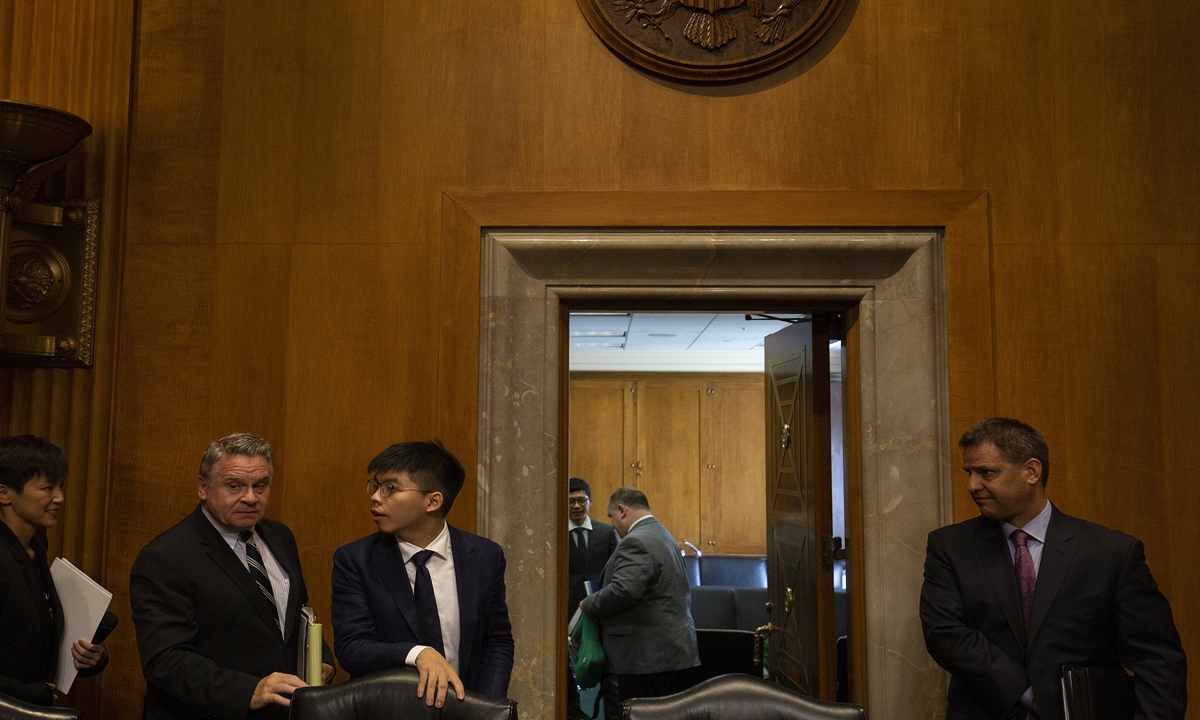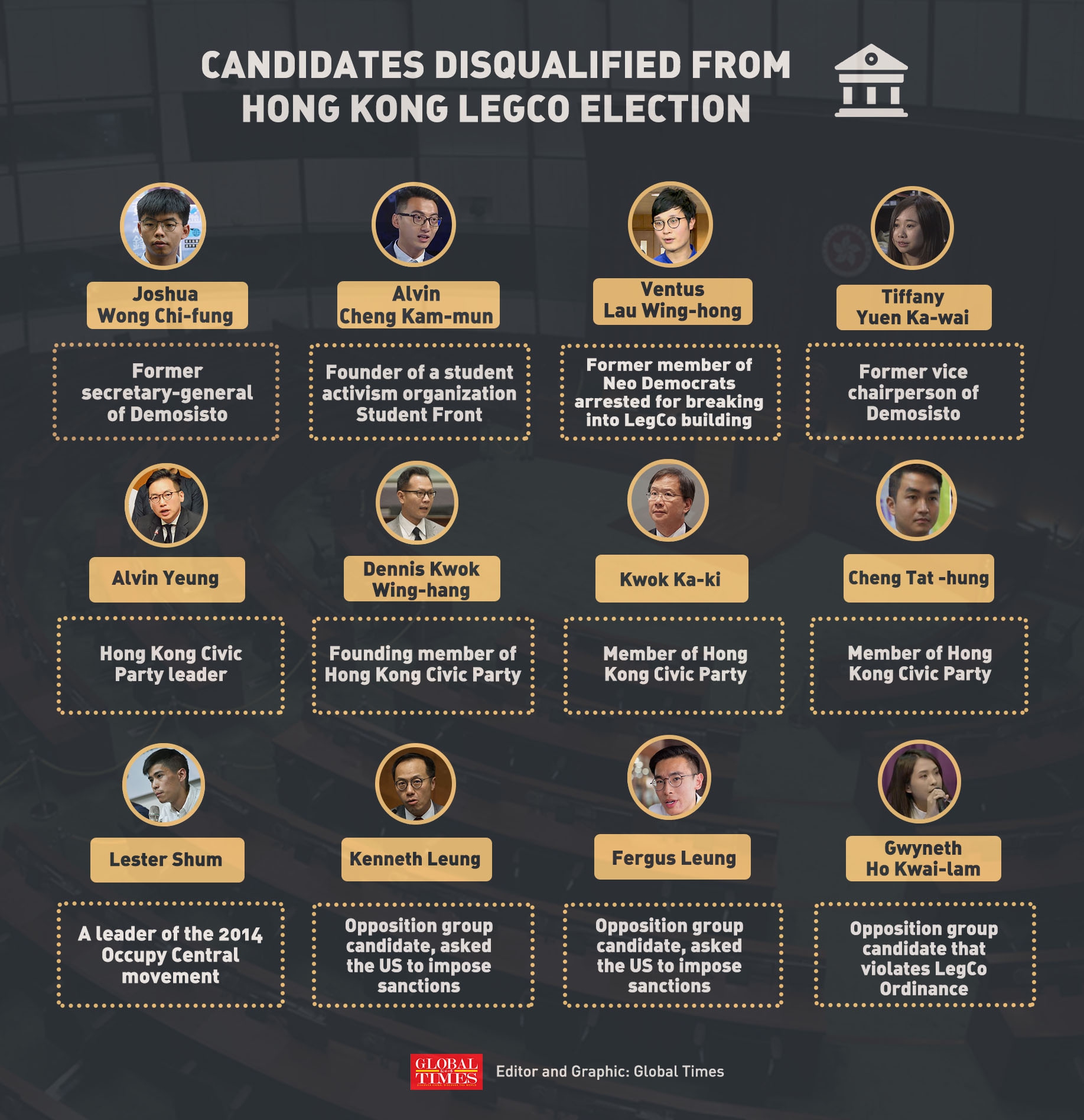HK junks 12 LegCo opposition candidates, reviews to remove secessionists
By GT staff reporters Source: Global Times Published: 2020/7/30 19:10:40 Last Updated: 2020/7/30 22:34:40

Hong Kong secessionist Joshua Wong (3rd L) leaves after a hearing at the Congressional-Executive Commission on China in Washington, DC, on September 17, 2019. Photo: AFP
Twelve candidates, including secessionist Joshua Wong, for Hong Kong's Legislative Council (LegCo) election scheduled for September 6 have been disqualified (DQ) for failing the requirements of the elections.
The Hong Kong Special Administrative Region (HKSAR) government said it supports the decision of the Electoral Affairs Commission (EAC), the government said in a statement on its website on Thursday, adding that the 12 candidates do not satisfy the requirements of the Legislative Council Ordinance, and electoral officers' decision has nothing to do with a so-called political review or limiting freedom of speech, or depriving their candidacy as alleged by some members of the community.
The Liaison Office of the Central People's Government in the HKSAR also released a statement on Thursday, supporting the disqualification of the 12 candidates that accords to law.
Some being disqualified advocated "Hong Kong independence" or "self-determination," some pleaded to foreign sanctions or vetoed government plans and some opposed the national security law for Hong Kong and claimed to "fight till the end." All are infamous for their misdeeds, the Liaison Office spokesperson said.
Lawrence Ma, a barrister and chairman of the Hong Kong Legal Exchange Foundation, told the Global Times Thursday that under section 40(1)(b)(i) of the Legislative Council Ordinance, a LegCo nominee has to sign a declaration to the effect that the person will uphold the Basic Law and pledge allegiance to the HKSAR.
"Because many of the opposition nominees have appealed to voters of their anti-government and anti-Basic Law stance, it will be hard for the electoral officer to believe that they will faithfully uphold the Basic Law and pledge allegiance to the HKSAR," Ma said.

Graphic: GT
Among the 12 being disqualified, besides Wong, are social activist Lester Shum and four members of the opposition Civil Party, including Dennis Kwok Wing-hang, Alvin Yeung Ngok-kiu, Kwok Ka-ki, and Cheng Tat-hung. Shum was a leader of the 2014 illegal "Occupy Central" movement in Hong Kong and served as deputy secretary-general of the Hong Kong Federation of Students (HKFS) from April 2014 to March 2015.
Dozens of opposition candidates, such as Yeung and Kwok, had reportedly received letters from the EAC officer, which asked for their stance on the newly enacted national security law for Hong Kong, foreign sanctions and "Hong Kong independence."
"The Civic Party asked the US for sanctions on Hong Kong and incited to paralyse LegCo, which means it cannot pledge allegiance to the government," said Tian Feilong, an associate professor at Beihang University in Beijing and a member of Beijing-based Chinese Association of Hong Kong and Macao Studies, told the Global Times Thursday.
The nomination period for the 2020 elections is from July 18 to 31.
The review for candidates is still ongoing, and the possibility that more candidates would be disqualified has not been ruled out, the HKSAR government said in the statement.
Kennedy Wong Ying-ho, solicitor of the Supreme Court of Hong Kong, predicted that the full DQ list will come out on Friday afternoon, as a number of candidates may submit applications by 5 pm on Friday.
The election will be postponed to next year, according to Hong Kong media reports, citing the worsening coronavirus situation in the city.
"The result will serve as an important reference for next year's election if it is postponed, as the list was a result of careful reviews and assessments," Wong said.
He noted that even if the EAC assigns a different officer next year, the current decision will stand.
"Those who were disqualified this time would be disqualified again," Wong said.
Ma believes the nomination and the election process will resume next year, but he echoed Wong by saying that it would be difficult for those disqualified to be nominated again next year, unless they fundamentally change their political views, and have to prove that they have changed.
He added that the process will help get rid of secessionists in the government.
In 2016, candidates for the LegCo elections were required to sign a form for the first time that declared they objected to "Hong Kong independence." Four candidates were invalidated for their pro-independence stance.
Following the 2016 elections, Hong Kong held two by-elections in 2018, in which five opposition candidates were disqualified. One of them was Agnes Chow Ting, Wong's close ally, because their now-inoperative group Demosisto advocated "self-determination."
In the 2019 district council elections, Wong was barred from running for the same reason, as his advocacy of "self-determination" for Hong Kong conflicted with the requirement for candidates to pledge allegiance to the city and uphold the Basic Law, which stipulates that Hong Kong is an inalienable part of China.
Kenneth Leung Kai-cheong, who was also among the 12 candidates being disqualified, posted a document on Facebook Thursday which states the officer's reasons for disqualifying him.
The document said, Leung, together with other representatives from Hong Kong (including incumbent LegCo members, Executive Council members and representatives of the HKSAR government), participated in a roundtable called "the US-Hong Kong Dialogue" in the US in March 2020. Subsequently, Leung and two other incumbent LegCo members, Charles Mok and Jeremy Tam, held a press conference on March 10, 2020 to report on the trip, its accomplishments and follow-up actions to be taken, with a focus on sanctions against the HKSAR by the US government under the Hong Kong Human Rights and Democracy Act.
The document said the Professionals Guild, an organization with which Leung is affiliated with, published on its Facebook page on March 8 an article which supports the imposition of sanctions by the US government.
The document concludes that a reasonable person, having considered the above acts and words by Leung and his political affiliation, would have doubts as to whether he has the professed intent to uphold the Basic Law and pledge allegiance to the HKSAR at the time when he signed the Declaration in the nomination form.
Horace Cheung Kowk-kwan, a member of the Legislative Council, told the Global Times Thursday that allegiance here means not only abiding by the Basic Law, but also supporting, promoting and believing in the Basic Law.
"Those supporting 'Hong Kong independence' or 'self-determination' will not show allegiance to the Basic Law or fulfil their obligations as LegCo members," said Cheung, adding that candidates who violate the national security law for Hong Kong are likely to be disqualified in future elections.
Cheung also said the disqualifications this time clearly show that the HKSAR will not allow people who support and advocate "Hong Kong independence" within the SAR system, which will deter "Hong Kong independence" forces.
Posted in: HK/MACAO/TAIWAN